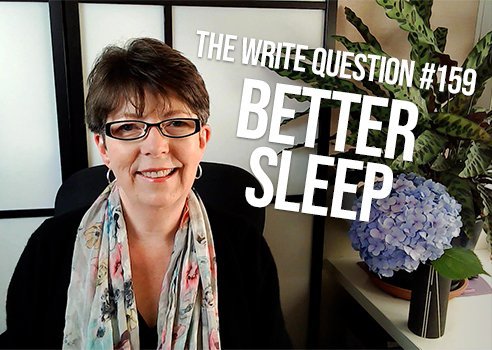Viewing time: 4 mins 47 secs
The Write Question is a weekly video podcast about writing that I started in 2017 and that ran, more or less weekly, until April 2022. This is a republication of issue #159, which addresses how to protect your sleep. The post first ran on Oct. 16/20.
Transcript:
What is the best way to protect your sleep? That’s the topic I’m addressing today in The Write Question. I’m Daphne Gray-Grant, the Publication Coach, still in pandemic mode.
I have a question from Aybüke Güzen, a student based in Akkara, Turkey. Here’s what she’s asked by email….
“How do you schedule your sleep? I work as a teacher and I’m also doing my master’s degree at the same time. However, I cannot do without eight hours of sleep. So how would you manage a situation like that?”
Thanks for your question, Aybüke. Did you know that in the application form for my Get It Done program, see link below, I ask several questions about sleep? This is not because I’m nosey. It’s because sleep is so deeply important to writers and to creativity. If you do not get adequate sleep, it will be much more difficult for you to write.
So, what exactly is an adequate amount of sleep? Experts say we all need somewhere between seven and nine hours. Given that you need eight, you are entirely normal and fall right in the middle. Be aware that one-third of Americans fail to get adequate sleep. See link below.
As for me, I had serious sleep problems for many years. In my much younger life, I worked all night one day a week and that really messed up my sleep habits. Then, after giving birth to triplets, I failed to get more than about five hours sleep per night for about four years. That just about did me in!
Eventually, I saw a doctor about my sleep problems and here are seven pieces of advice he gave me:
1 – Start by compressing your sleep. To begin, try to get no more than six hours sleep per night. This will be painful but it will make you more efficient about sleeping. But you need to do that for only two weeks, then you can add in an extra 15 minutes of sleep per night until you feel you’re getting really adequate sleep. See link below for more information on this step. It works for about 80% of people.
2 – Develop the habit of always getting UP at the same time every day of the week — even on weekends. Even if you end up going to bed late, get up at your regular time. You may be somewhat sleep-deprived on that one day but you will be protecting your sleep habit, which is the more important goal.
3 – Try to go to bed at the same time every night —even on weekends. Do you see a theme here? You want to establish regular habits.
4 – Make sure your bedroom is totally dark. If you have a digital clock, cover it up. Or if light seeps in underneath the door, put a towel there. Or, you can wear an eye covering. I recommend something called a Nitehood sleep mask, link below. I am not a reseller so I won’t make any money if you decide to buy one.
5 – Make sure your room is cool enough. The ideal temperature is 65 degrees F (18.3 C). If you live in a hot climate and don’t have air conditioning, see if you can use a fan to at least circulate the air.
6 – Avoid caffeine after 2 p.m. And be aware that in addition to monitoring your coffee and tea, you also need to pay attention to soda pop, chocolate and some cold remedies — these items often have caffeine, too.
7 – Set yourself an alarm for going TO bed. Most of us are accustomed to the idea of an alarm to wake up but if you have difficulty going to bed on time, set yourself an alarm for sleeping as well. This strategy is very effective for many people.
If you follow all of these habits, you will have taken important positive steps to improve your sleep.
Finally, let me wrap up with a quote from the American writer Ernest Hemingway.
“I love sleep. My life has the tendency to fall apart when I’m awake.”
Aybüke, many people act as though they’re heroes for getting little sleep. Instead, sleep is a normal human need and we’ll all do better if we develop a plan for getting enough of it. The steps my doctor outlined should help you do exactly that.
*
If you’d like to learn more about how to make writing a happier and more rewarding process, check out my latest book, Your Happy First Draft. I don’t sell it in bookstores or via Amazon. The only place to buy it is on my website, link on the screen below and in the show notes.


